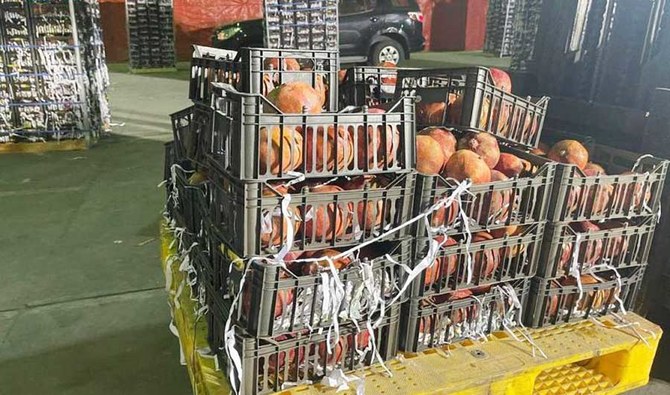BEIRUT: A pomegranate shipment hiding millions of Captagon pills entered Lebanon in stages through the Masnaa border crossing with Syria, a Lebanese customs official has claimed in an interview with Arab News where he tried to lessen his country’s responsibility for the drug-stuffed fruit shipment which has recently caused Saudi Arabia to ban all fruit and vegetables imports from Lebanon.
The narcotic-stuffed shipment was seized in Dammam last Friday.
On Monday President Michel Aoun said Lebanon was keen not to endanger the safety of any country, while caretaker Prime Minister Hassan Diab said neither Lebanon nor its people would accept any harm caused to the Saudis.
“We are with the Kingdom in combating smuggling networks and pursuing those involved,” Diab said.
Preventing smuggling from Lebanon’s borders was the focus of a meeting chaired by Aoun, with ministers and officials from security and customs services taking part.
Saudi Arabia was urged to “reconsider” its ban, which came into effect on Sunday, and Interior Minister Mohammed Fahmi was assigned to communicate and coordinate with the Kingdom’s authorities to “follow up the procedures to discover the perpetrators and prevent the recurrence of such odious practices.”
But a customs source revealed the scale of the challenge, as well sharing insights into the smuggling process.
“It is a constant war with smugglers and it needs advanced equipment while we work manually,” the customs source told Arab News. “The quantity of pomegranates that contained Captagon tablets entered Lebanon in stages on more than one truck at the end of January through the Masnaa border crossing with Syria. Documents of the consignments indicated that the pomegranates were imported for internal Lebanese consumption and bear a certificate that they are of Syrian origin and not intended for transit.”
The scanners that trucks and refrigerators passed through from Syria to Lebanon at land crossings and the port were defective. They were Chinese-made, 30 years old, and had not had any maintenance.
“So the goods are inspected manually. Customs at the Masnaa border crossing usually inspect 20 percent of the truckload in transit.”
The pomegranate consignments that entered in stages were collected in an abandoned hangar in the town of Taanayel in the central Bekaa.
They were re-loaded into Lebanese refrigerated trucks to export them to Saudi Arabia as a Lebanese product in the name of the Cedar Company, which was owned by two Syrians with cover from a Lebanese person who was a major shareholder.
The owners of the company paid all the fees due on the shipment and they were usually high.
“The smugglers know that transit goods from Syria to Saudi Arabia are subject to vigilant inspection.”
Smugglers used Lebanese refrigerated trucks to avoid detection of their cargo because Saudi authorities had more confidence in dealing with the Lebanese side and the scrutiny was “less intense,” according to the source.
The shipment set off from Lebanon in early February and needed about 15 days to reach Saudi Arabia by sea.
When the existence of drugs in the shipment was discovered in the Kingdom, authorities informed the Lebanese side before announcing it in the media.
Lebanese security services followed the course of the shipments, discovered what had happened in Taanayel and arrested the two Syrians, who were brothers.
The customs source told Arab News that Gulf states had long complained of drug smuggling operations to their territories from Syria via Lebanon.
“Lebanese security services have been keen to tighten supervision in this regard. However, drug traffickers always invent new unexpected methods.”
One of the participants at the Monday meeting was the head of the Farmers and Peasants Association in the Bekaa Valley Ibrahim Tarshishi, who was hopeful about the ban being lifted.
“What we have heard about the measures that will be taken makes us optimistic about the possibility of reopening the borders to Lebanese agricultural products to the Gulf countries,” he told Arab News.
He said 40 trucks loaded with Lebanese agricultural products were currently stuck between Beirut and Jeddah. “Their fate is unknown,” he added.
Aoun stressed that smuggling of all kinds, including drugs, fuel and other materials, harmed Lebanon and “cost it dearly, and the recent smuggling operation to Saudi Arabia demonstrates this.”
He asked about the reasons for the delay in purchasing scanners to be placed at crossings, even though the decision to do that was taken last July, and called for the swift completion of the purchasing process.
There was a statement from the meeting at the presidential palace about Lebanon’s keenness on “maintaining the strength of fraternal relations” with Saudi Arabia and the condemnation of everything that would “prejudice its social security or the safety of its brotherly people, particularly the smuggling of prohibited and narcotic materials, especially since Lebanon categorically rejects that its facilities be a gateway for such disgraceful crimes.”
The meeting also requested that exporters abide by the rules of foreign trade and to check exported products to preserve Lebanon’s reputation.



























